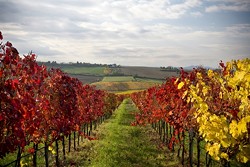
- FILE PHOTO
In recent years, our county has become a popular “destination wedding” location, with couples traveling here to celebrate their weddings surrounded by glorious vineyards, golden hills, and majestic oaks. Though destination weddings may be new to our county, weddings and special events have been celebrated on agricultural lands since the beginning of recorded history. The connection between weddings and agriculture is even enshrined in our language: The word “husbandman” means “farmer.”
As events have become a source of supplemental income for landowners, a few disgruntled individuals have waged an unrelenting campaign to paint weddings and events on rural land as the equivalent of commercial “circuses” and “Disneylands,” while portraying their NIMBY crusade as an attempt to protect agriculture from unidentified “big development” interests.
Their assertions are made without factual support or logical consistency. For example, at a forum on June 26, they argued that non-ag events “exhaust the resources” of ag land, but were unable to identify a single county property where this had occurred. They argued that eliminating the income from weddings and events would encourage landowners to keep their properties in agricultural production, but provided no data in support.
While insisting that non-ag income-producing events harm agriculture, the same individuals support allowing nonprofit and non-income-generating events on ag land without restrictions on size or frequency, even on fragile historic properties, even as they concede similar-size events have identical impact (SLO Events Forum July 7, 2009). The average wedding on rural land has fewer than 175 attendees; nonprofit events often draw hundreds, even thousands of people. Apparently, it’s not the impact on the land but the income derived by the landowner that “harms” agriculture.
Using an all-too-familiar tactic, these individuals vilify anyone who rejects their agenda, accusing everyone else of selling out the environment in favor of unrestricted growth and development. Yet the crowds who turned out at hearing after hearing to support events were largely comprised of caterers, innkeepers, photographers, florists, coordinators—small business owners who contribute jobs and dollars to our economy, whose livelihoods depend on the county’s vineyards and ranches remaining rural. Landowners who host events spoke of their commitment to agriculture, and their struggles to preserve ag land for future generations. These landowners said event income helps farmers survive lean years and price fluctuations.
We don’t doubt that some who rail against non-ag events may also be committed environmentalists. But if you delve into the arguments made by many who are strident in their opposition to events, what surfaces is not evidence of damage to agriculture or the environment, but rather an interest in prohibiting weddings in their neighborhoods. It’s NIMBY, not agriculture, that drives them.
Undoubtedly, there are irresponsible landowners who fail in their obligation to their neighbors, as well as properties that are simply not suited for events. A recent hearing saw the Board of Supervisors vote unanimously to restrict events where significant problems had been documented. Supervisor Hill emphasized that those seeking to host events have a “maximum responsibility” to their neighbors.
Though the majority of landowners are responsible neighbors, in response to these legitimate concerns, we proposed an Events Venue Association that will promote best practices for this cottage “industry,” work to resolve neighborhood issues, and track complaints against offending venues.
Those of us working to maintain our lands do not need to be reminded that rural and agricultural lands require careful stewardship. We are the stewards. Event income helps us maintain the land and reduces the pressure to sell to developers. Subdivision, not events, drives the loss of ag land. Those of us who allow our fields, vineyards, and ranches to be settings for special celebrations are continuing time-honored agrarian traditions, adapted to a changing world in which events can help agriculture remain economically viable. ∆
Daniella Sapriel and J. Tavener Holland are co-chairs of the Coalition of Affected Business Owners, a group of landowners and small businesses interested in the county’s events policies. Sapriel owns Hummingbird House and Vineyard in Templeton. Holland’s family owns a ranch in San Luis Obispo. Contact them via the editor at [email protected].
Comments